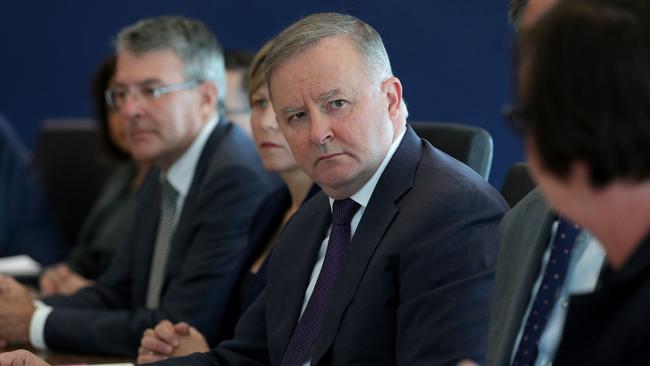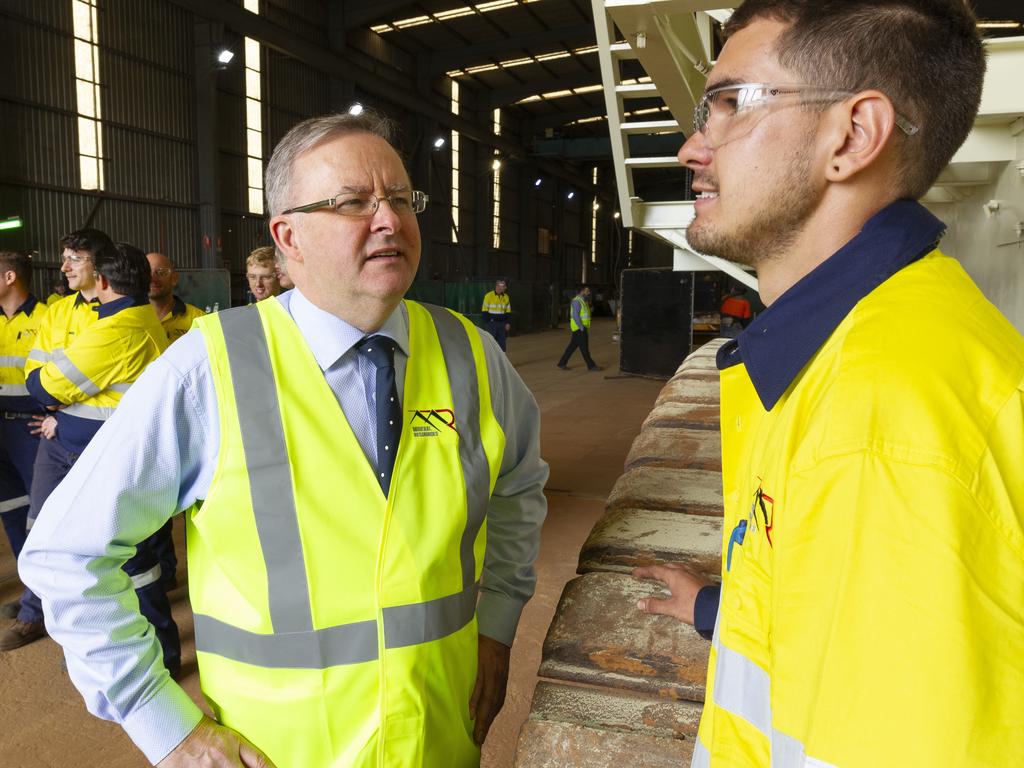IR casual work reforms set Anthony Albanese on collision course with unions
In a move sure to raise union hackles, Anthony Albanese has signalled changes for casual “gig economy” workers.

Anthony Albanese has set course for a major clash with unions by flagging reform of the current industrial relations system to cater for the growing casual workforce while heralding a policy shift away from protectionism past to broader support for free trade deals.
In his first concrete policy announcement, the Labor leader said a Labor government would also legislate a skills and training authority based on the Infrastructure Australia model that would bring unions, business together to guide policy on the future workforce.
Delivering the first his “values” speeches, Mr Albanese signalled reforming the industrial relations to give more protections for workers in the “gig economy” who choose to have more flexible working hours.
READ MORE: Albanese returns to coalface to woo blue-collar workers | ALP’s cut and paste bush party | We were right to go left, says Carr | Working class woes for Labor | | Election tweet a misjudgment
The Opposition leader said it was not a move to “de-unionise” workplaces but the realities of the future workforce needed to be addressed such as providing portable entitlements for those who chose casual employment.
“Our industrial relations system is being strained by the emergence of new forms of employment arrangements,” Mr Albanese told a meeting in Perth today of the Committee for Economic Development of Australia.
“One such trend is growth in intermediated or on-demand employment, such as the growth in the gig economy.
“And non-standard work is seen across industries.
“For employers, non-standard arrangements can help with volatility or short term spikes in demand for labour.
“But let me be clear, we want people to elect to take on this form of work because it benefits them, not have it imposed on them by lack of choice.
“And not as a tool to de-unionise workplaces as a step to lowering wages and conditions.
“For many employees, these arrangements can be beneficial. They can provide flexibility and additional income in the form of a secondary job.
“Today we have close to 1.5 million secondary jobs, some with a median income of up $9500 depending on the industry. Forty per cent of Uber drivers, for example have a separate full-time job, or own a business.
New forms of ‘worker protections’
“As research demonstrates, many Uber drivers adopt the platform precisely for the flexibility it provides.
“It is time to have a conversation about new forms of worker protections, which can be made as flexible as the gig economy jobs they could cover, as well as benefit more traditional industries.”
Having already set the stage for a clash with the union movement at the ALP conference next year following his support for the Coalition’s free trade deals with Indonesia, Hong Kong and Peru, Mr Albanese said Labor needed to make the distinction between protectionism and protections.
“We need to ensure workers get their fair share of gains in national productivity,” Mr Albanese said.
“But let me be very clear.
Protectionism ‘detracts from growth’
“Supporting protections is not the same as supporting protectionism.
“A trading nation such as ours cannot depend on the latter. Protectionism detracts from growth and punishes consumers and businesses.
“But protections are different.
“They are the insurance we take on to reduce uncertainty, strengthen confidence, manage risk, and support enterprise.”
The third major plank of his “vision” statement was aimed at the skills crisis in Australia.
“I am determined to circuit-break the crisis in training and vocational education,” he said.
“Today I announce that Labor in Government will establish a new national partnership to drive improved outcomes in the vocational education and training sector and to strengthen workforce planning, particularly in the growing sectors of our economy: Jobs and Skills Australia.
“And for the first time, I want this to be a data-driven exercise, working in real time with labour markets technology – such as Seek and LinkedIn – to drive real outcomes.
“In short we have a labour market characterised by the mismatch between what workers have to offer, and what employers need.
“Over the past six years, the current Government has issued half a million visas to foreign workers. We should be, wherever possible, training Australians for current and future jobs.”
“A logical place to start would be to support workers today in accumulating the skills and capabilities that assist them personally, but also support industry to expand its potential.
“Nowhere is this more important than through reform of vocational education, where the system is basically broken.
“We must commence a national project to repair our VET system.
“We see a steep decline in Australians who are working towards an apprenticeship, with 150,000 fewer apprentices and trainees today than when this Government took office.”






To join the conversation, please log in. Don't have an account? Register
Join the conversation, you are commenting as Logout